Given the current state of the world for women, there has never been a more urgent time to tell stories that explore the devastating consequences of denying women agency over their bodies and lives. The Girl with the Needle resonates deeply in this context, shedding light on the systemic injustices that force women into impossible choices and silence their voices. Through its stark narrative, the film transcends the boundaries of a traditional Period Drama, emerging as a powerful commentary on the struggle for autonomy, dignity, and equality. At the same time, it lays bare the devastating consequences that can arise when those fundamental rights are stripped away.
With all of this in mind, The Girl with the Needle is a gripping Crime Drama written and directed by Magnus von Horn (The Here After 2015, Sweat 2020). Opening in US theaters on December 6, 2024, it stars Vic Carmen Sonne (Holiday 2018, Explosions in My Heart 2024) as Karoline and Trine Dyrholm (Queen of Hearts 2019, Poison 2024) as Dagmar, the film explores the harsh realities of post-WWI Copenhagen through the eyes of Karoline, a young factory worker navigating unemployment, abandonment, and an unexpected pregnancy. Distributed by Mubi, this haunting tale takes a dark turn as Karoline forms a bond with Dagmar, the enigmatic head of an underground adoption agency, only to uncover the devastating secrets behind their fragile alliance.
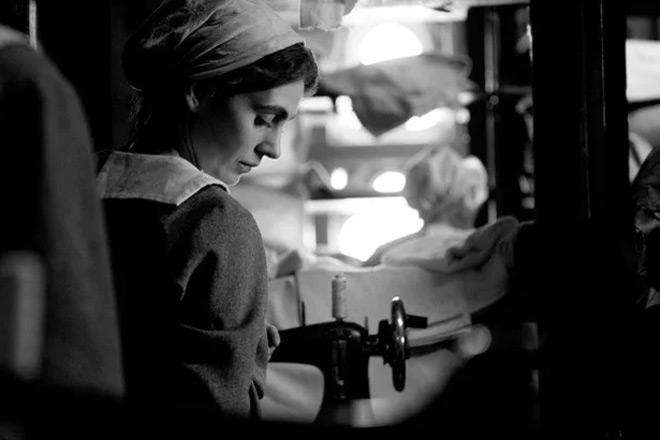
Overall, The Girl with the Needle’s striking black-and-white cinematography deepens its emotional resonance, enveloping the story in a harsh, unforgiving visual style that mirrors the bleak realities of its characters’ lives. This choice not only transports the audience to the post-WWI era, grounding the narrative in its historical context but amplifies the timeless relevance of the film’s themes -particularly the struggle for women’s autonomy and systemic injustice. The stark imagery serves as a powerful reminder that these issues, though set in the past, remain deeply entrenched in society today.
The interplay of light and shadow creates an eerie, haunting atmosphere that underscores the feelings of isolation and despair that permeate Karoline’s journey. Each frame is meticulously crafted, drawing the viewer’s eye to the gritty details of Copenhagen’s harsh landscape while amplifying the emotional weight of the story. This visual austerity heightens the sense of powerlessness and survival, allowing the audience to experience the suffocating world in which the characters are trapped.
Adding to the unsettling tone is its eerie, minimalist score, which weaves through the story like an invisible thread. The haunting score mirrors the growing tension and unease that permeate Karoline’s world, its discordant notes amplifying the emotional turmoil she endures. At times, the music becomes so chaotic and abrasive that it almost feels painful to listen to, forcing the audience to share in Karoline’s suffering. This soundscape not only heightens the film’s atmosphere, but also deepens the emotional experience, making the audience feel every moment of tension, fear, and despair alongside her. Moments of silence are punctuated by chilling motifs, heightening the emotional stakes and drawing the audience deeper into the characters’ internal struggles. Together, the stark black-and-white cinematography and the haunting score work in unison to create an immersive, visceral experience that envelops the audience in Karoline’s world, amplifying the emotional intensity and making her struggle feel all the more immediate and devastating.
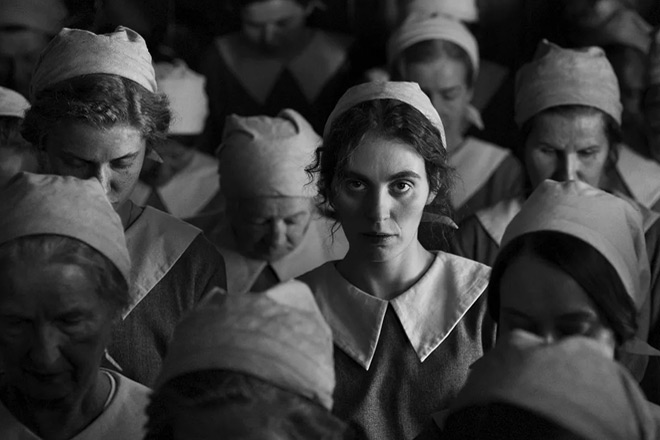
The Girl with the Needle subverts the traditional Crime Drama genre with its disturbing plot, blending elements of Horror and psychological tension to unsettle the audience. At every turn, Karoline is confronted with impossible choices that erode her agency and plunge her deeper into disturbing situations. When the audience is offered a glimmer of hope, it is quickly shattered—often by a character’s decision to make the most selfish choice. This cycle of fleeting hope and inevitable despair heightens the sense of helplessness, as the characters’ actions consistently lead to darker and more troubling consequences. There are reveals that, at first glance, could be seen as outrageous or almost too extreme to believe. However, in the context of the film’s bleak and oppressive world, these choices feel disturbingly inevitable. Audiences should be warned, however, that they will be left feeling deeply disturbed (perhaps even angry), making it difficult to shake off the film’s events and emotional weight.
Sonne’s portrayal of Karoline is both haunting and heartbreaking, capturing the emotional devastation of a young woman pushed to her limits. Her performance anchors the film, allowing the audience to feel every moment of fear, confusion, and powerlessness. At times, the audience may find it difficult to comprehend, let alone accept, the harsh realities that Karoline is forced to endure. Dyrholm’s portrayal of Dagmar is a chilling blend of charm and manipulation, with her enigmatic presence adding a deeply unsettling layer to the story. As the narrative unfolds, Dagmar’s true nature is slowly revealed, and when it is finally exposed, the revelation is all the more shocking. Having built a sense of trust with Karoline—and the audience – her betrayal hits with unexpected force, amplifying the sense of deception that underpins the film’s dark narrative. Together, their performances create a compelling, volatile relationship that drives the narrative forward.
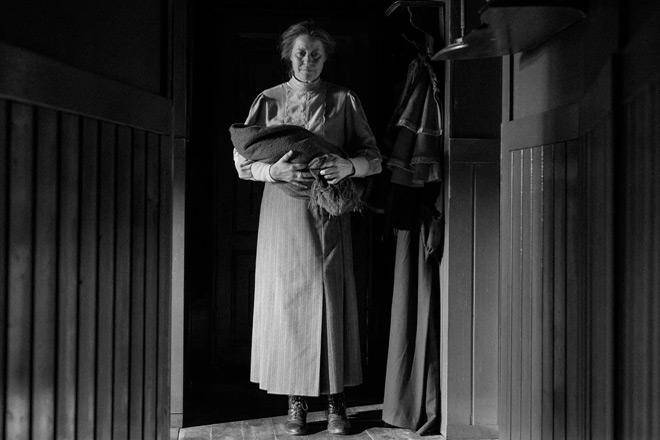
In the end, The Girl with the Needle is an uncompromising and deeply unsettling exploration of a woman’s struggle for agency in a world that continually robs her of it. With its haunting cinematography, intense performances, and chilling score, the film immerses the audience in a suffocating atmosphere of despair and powerlessness. The story’s unrelenting twists and morally ambiguous characters force the viewer to confront uncomfortable truths about societal injustices that persist across time.
As a stark, poignant commentary on the price of autonomy and dignity, The Girl with the Needle is not just a period piece, but a timely reminder of the enduring fight for women’s rights and the devastating consequences of their denial. That is why Cryptic Rock gives it 4 out of 5 stars.
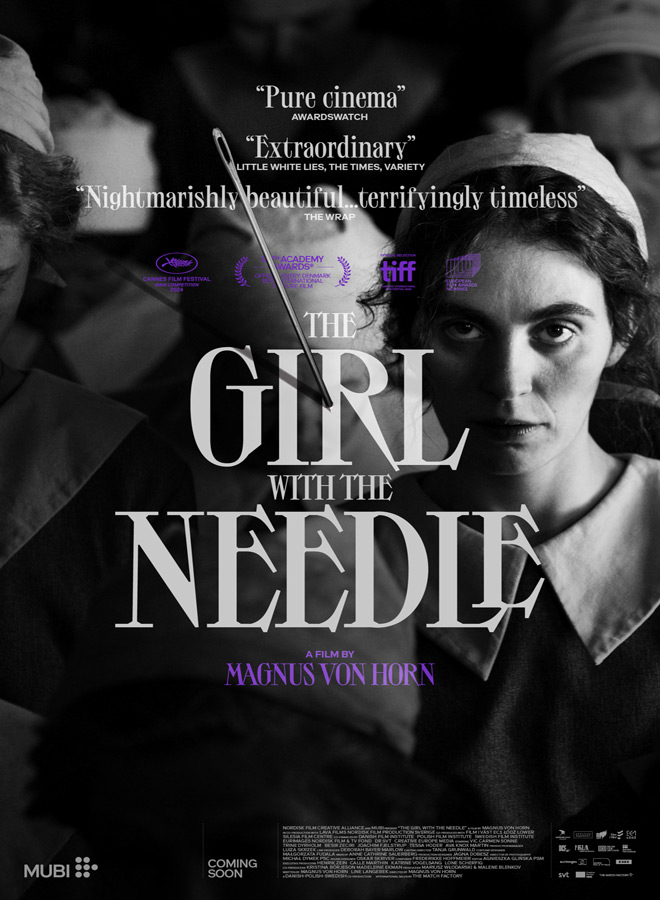
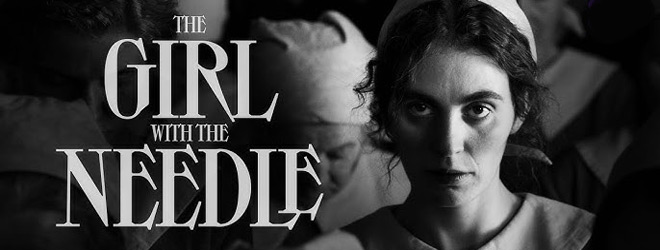

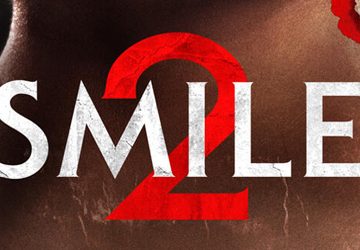


No comment